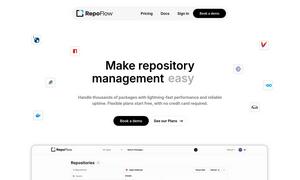
Discover the Best AI Tools to Boost Your Productivity
Find the Best AI Tools to Optimize Your Work and Personal Tasks
Best AI Tools for Open Source Platform in 2024
What is Open Source
An Open Source Platform is a software framework that allows users to modify, enhance, and share the source code freely. Its main purpose is to foster collaboration and innovation, enabling developers to create customized solutions quickly. Standout benefits include community support, transparency, and cost-effectiveness, making it ideal for diverse projects.
How Open Source works
An Open Source Platform works by providing unrestricted access to its source code, allowing users to examine, modify, and enhance the software according to their specific needs. Developers typically begin by downloading the platform, then customize the codebase, contributing improvements or extensions back to the community. Best practices include staying updated with community releases, following coding standards, and documenting changes to ensure collaborative growth and innovation.
What are the advantages of Open Source?
The advantages of an Open Source Platform include enhanced cost-effectiveness, as users can avoid expensive licensing fees typically associated with proprietary software. Its collaborative nature fosters a rich ecosystem of shared knowledge and resources, driving innovation. Users benefit from transparency, security from community oversight, and the ability to tailor solutions to fit their unique requirements, enhancing operational efficiency.
Key Features for Open Source
Community Collaboration
The standout feature of an Open Source Platform is its community collaboration, allowing developers to contribute to projects, share enhancements, and receive support from a diverse pool of expertise. This vibrant ecosystem fosters innovation, making it easier for users to create tailored solutions that meet their specific needs effectively.
Customizable Solutions
Another key feature of an Open Source Platform is its ability to offer customizable solutions. Users can modify the source code to create software tailored to their unique workflows and requirements. This flexibility enhances user satisfaction and operational efficiency, providing significant value in various industries.
Transparent Development Process
A third key feature of an Open Source Platform is its transparent development process, which allows users to track changes, updates, and enhancements made by the community. This openness builds trust and ensures accountability, resulting in a robust software development environment that encourages continuous improvement.
Use Cases for Open Source?
Open Source Platforms are utilized in various scenarios, such as developing web applications, hosting online learning environments, and supporting enterprise software solutions. These platforms effectively solve issues related to customization and scalability, catering to specific organizational needs. For instance, educational institutions leverage open source for learning management systems, while startups utilize it for rapid application development, addressing performance and growth challenges.
FAQs for Open Source
What benefits does an Open Source Platform offer for collaboration?
An Open Source Platform offers significant benefits for collaboration by enabling developers to share modifications, enhancements, and support, fostering a community of innovation. This collective effort enhances software quality and ensures users can access diverse solutions tailored to their specific needs, driving efficiency and effectiveness.
How does customization work within an Open Source Platform?
Customization within an Open Source Platform operates by allowing users to access and modify the source code freely. Users can tailor applications to fit their unique requirements, leading to innovative solutions that directly address specific organizational challenges while leveraging community support for ongoing improvements.
What are the key applications of an Open Source Platform in different industries?
Key applications of an Open Source Platform span across various industries, including education, healthcare, and technology. These platforms facilitate customized software development, support collaborative projects, and help organizations streamline operations by providing scalable solutions tailored to unique operational needs.
What makes an Open Source Platform unique compared to proprietary software?
An Open Source Platform stands out from proprietary software due to its accessibility, transparency, and collaborative nature. Users can modify the software freely, fostering innovation and customization that proprietary systems often lack. This unique feature empowers users and promotes a vibrant, thriving community.
What are the essential benefits of using an Open Source Platform?
Essential benefits of using an Open Source Platform include cost savings, flexibility, and community support. Users can modify the software without incurring licensing fees, adapting it to their needs while benefiting from collective input and enhancements, ultimately leading to improved functionality and satisfaction.
How do users benefit from the unique features of an Open Source Platform?
Users benefit from the unique features of an Open Source Platform by gaining access to customizable software that can evolve with their needs. The collective insights of the community lead to enhanced security, improved functionality, and innovative solutions, ensuring users have the tools necessary to succeed in a competitive landscape.








